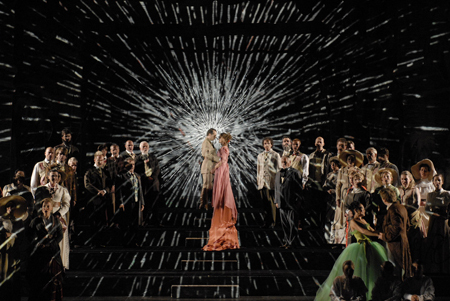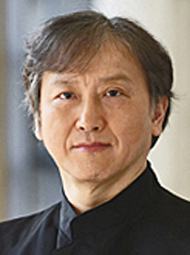Message from the Artistic Director of Opera about our 2018/19 Season
2018/2019 Season Opera
10 PRODUCTIONS IN TOTAL including 4 NEW PRODUCTIONS
 |
La Flûte enchantée (The Magic Flute) by W. A. Mozart© Elisabeth Carecchio - Festival d'Aix-en-Provence 2009 |
DIE ZAUBERFLÖTE (THE MAGIC FLUTE) / Wolfgang Amadeus MOZART [New Production]
3, 6, 8, 10, 13, 14 October 2018
CARMEN / Georges BIZET
23, 25, 27, 30 November, 2, 4 December 2018
FALSTAFF / Giuseppe VERDI
6, 9, 12, 15 December 2018
TANNHÄUSER / Richard WAGNER
27, 30 January, 2, 6, 9 February 2019
ASTERS / NISHIMURA Akira [Newly Commissioned Opera / New Production]
17, 20, 23, 24 February 2019
WERTHER / Jules MASSENET
19, 21, 24, 26 March 2019
EINE FLORENTINISCHE TRAGÖDIE (A FLORENTINE TRAGEDY) / Alexander ZEMLINSKY [New Production]
GIANNI SCHICCHI / Giacomo PUCCINI [New Production]
7, 10, 14, 17 April 2019
DON GIOVANNI / Wolfgang Amadeus MOZART
17, 19, 22, 25, 26 May 2019
MADAMA BUTTERFLY / Giacomo PUCCINI
1, 4, 7, 9 June 2019
TURANDOT/ Giacomo PUCCINI [New Production]
18, 20, 21, 22 July 2019
Message from the Artistic Director of Opera, ONO Kazushi
The 2017/2018 season marked the 20th anniversary of the Theatre's opening. Following in the footsteps of my predecessors, who have built up a repository of colourful history here, I feel a great sense of responsibility and, at the same time, a resolve to press on ahead with new creative endeavours.
Upon taking office as the artistic director of opera, I would also like to share the following five major objectives for the future.
First of all, expansion of repertoire: Having thus far introduced three new works each year, the New National Theatre, Tokyo is now planning to expand that to four. Within this framework, we will aim to produce our own world-first productions as well as to take the initiative to present well-known productions by popular producers who are active in the opera scene worldwide. Although the New National Theatre, Tokyo has thus far presented many of the best works of the 20th century, these have often been under a rental arrangement from opera houses overseas, leaving our theatre none the richer after the performance, with nothing we are able to incorporate into the diverse palette of which we are so proud. Accordingly, we are aiming to create systems that will enable us to repeat productions that we have brought in from overseas.
Secondly, we will commence a series of commissioned works by Japanese composers. Every other season we will commission a new opera from an exemplary Japanese composer and aim to ensure an unprecedented level of collaboration between the composer, scriptwriter, director and artistic director during the creation of the work, thus establishing a new benchmark of innovation in the history of Japanese opera, both musically and theatrically. We envisage that some of these Japanese operas will be taken up by opera houses overseas.
Thirdly, we will present new productions of two single-act operas (in a double-billing) and new baroque operas every other year. Double-billing increases the number of performances in an evening. For instance, PUCCINI's "Gianni Schicchi" would be coupled with ZEMLINSKY's "Ein florentinische Tragödie" in the first year, followed by a combination of "Gianni Schicchi" and another single-act opera the next year. Such a programme surely packs twice the punch. As we have thus far not staged any baroque operas at the New National Theatre, Tokyo, we have a lot to look forward to in the 2019/2020 season and beyond with what, for us, is a new genre of opera.
Fourthly, we would like to bring in-demand directors and performers to the New National Theatre, Tokyo, as quickly as possible. The three producers we have invited to the Theatre are the creators and experts who I have long wanted to introduce to Japan. They come with their own uniquely spectacular visual experiences to the opera stage. I myself have had the opportunity to appear alongside them, and know them to be the most creative artists of our generation. Our productions have included a number of outstanding Japanese performers in major roles, as well as those from overseas. We would like to have Japanese performers here who have been supportive of the New National Theatre Tokyo, as well as new faces in Japanese talent who are making a name for themselves overseas.
Fifthly, we want to actively collaborate with other opera houses. We aim to create opportunities to stage world premieres by celebrated directors at the New National Theatre, Tokyo, and therefore wish to collaborate with opera houses overseas to forge a new era in which new Japanese opera productions can be shared with the world. I have already started conversations with the directors of several other opera houses regarding specific co-productions. These will come to fruition as a shining example of a classical opera repertoire that Tokyo can bring to the rest of the world. At the same time, we would like to strengthen our ties with other opera houses in Japan as well as the other divisions of the New National Theatre, Tokyo (Drama, Ballet & Dance and the Training Programme).
Allow me to introduce the four new productions we will be presenting this season. "Die Zauberflöte (The Magic Flute)" is a production by William KENTRIDGE, a South African master of contemporary art known for his projection wizardry in opera production. Since its debut at the Théâtre Royal de la Monnaie/Koninklijke Muntschouwburg in 2005, this production has been performed at a number of opera houses and has become a sensation in Europe.
Following on in the line-up is the first in our series of commissioned works by Japanese composers: "Asters" by NISHIMURA Akira, based on the novel by ISHIKAWA Jun. This work is directed by the unparalleled, world-famous, Japanese opera director, OIDA Yoshi. The story portrays 'the life of an artist', in which a talented young man born into a family of poets queries the meaning of his own existence. It could be described as an operatic Japanese "Jean-Christophe". It will be interesting to see how the NISHIMURA-OIDA partnership translates ISHIKAWA Jun's aesthetic and passionate world into opera.
Next is the double-billing of two single-act operas in a single evening: ZEMLINSKY's "Ein florentinische Tragödie (A Florentine Tragedy)" and PUCCINI's "Gianni Schicchi". Both works are set in Florence. One is a tragedy portraying a love triangle between two men and a woman and is based on an original by Oscar WILDE, while the other is a chaotic comedy about succession and inheritance, based on 'Inferno' in DANTE's "Divine Comedy". Our first double-billed performance is directed by AGUNI Jun, who is freely conversant in Italian and has brought new direction to Japan's opera scene.
Finally, "Turandot". This is a new PUCCINI production that will be produced as an opera for the first time in Tokyo by Àlex OLLÉ, artistic director of the Spanish group La Fura Dels Baus, and of worldwide opera fame. OLLÉ's world-first production of an opera in Tokyo is bound to be the talk of the opera world.
Also this season, six performances from the New National Theatre, Tokyo's proud repertoire include a good balance of productions from Italy, Germany and France.
Fresh faces among the conductors this season include Roland BÖER, who conducted Kentridge's "Die Zauberflöte (The Magic Flute)" at La Scala, Jean-Luc TINGAUD, who conducted "Carmen" at the Arena di Verona, and the young, talented Italian, Francesco LANZILLOTTA conducting "Don Giovanni"following his debut in Naples and Dresden. Returning with the baton are Carlo RIZZI ("Falstaff"), Paul DANIEL ("Werther") and Asher FISCH ("Tannhäuser"), who are building solid careers as opera conductors.
Performers this season include Steve DAVISLIM, who has taken Europe by storm in the role of Tamino, and Japanese celebrity HAYASHI Masako in the role of Pamina. Carmen will be played by Ginger COSTA-JACKSON, who debuted in this role at the Metropolitan Opera House, while Falstaff will be played by distinguished Italian performer Roberto DE CANDIA. Torsten KERL, who has previously demonstrated prowess in Wagnerian opera title roles, will be playing Tannhäuser; the role of Don Giovanni will be taken up by Nicola ULIVIERI with all the savour of a rich, sophisticated wine, while "Turandot" will see two of Japan's shining sopranos, NAKAMURA Eri and SUNAKAWA Ryoko, sharing the stage with Iréne THEORIN and Riccardo ZANELLATO. A major highlight will be the appearance of Japan's own FUJIMURA Mihoko in the anticipated role of Charlotte in "Werther".
How wonderful it must be to pursue one's dreams together at the Opera House.

Profile of ONO Kazushi (Artistic Director of Opera)
Born in Tokyo. Graduated from Tokyo University of the Arts. Studied piano and composition under ANDO Hisayoshi and conducting under ENDO Masahisa. Also studied under Wolfgang SAWALLISCH and Giuseppe PATANÈ at the Bavarian State Opera.
In 1987, he won the Arturo Toscanini International Competition for Conductors. Since then, he has continued to charm audiences with guest appearances at opera performances and symphony concerts around the world.
He served as the musical director of the Zagreb Philharmonic Orchestra in Croatia from 1990 to 1996. From 1996 to 2002, he served as the general musical director at Badisches Staatstheater Karlsruhe in Germany. Having served as the resident conductor of the Tokyo Philharmonic Orchestra from 1992 to 1999, he is currently the Orchestra's Honorary Conductor Laureate. From 2002 to 2008, he served as the musical director at the Théâtre Royal de la Monnaie/Koninklijke Muntschouwburg in Belgium. He was the principal guest conductor for the Arturo Toscanini Philharmonic Orchestra in Italy from 2012 to 2015, as well as for the Opéra National de Lyon in France from 2008 to 2016. Since 2015, he has served as the musical director for the Tokyo Metropolitan Symphony Orchestra as well as the Barcelona Symphony Orchestra.
He made his opera debut in June 2007 at La Scala in Milan. Since then, he has made a number of appearances at the Metropolitan Opera House, the Paris Opera, the Bayerische Staatsoper, the Glyndebourne Festival Opera and the Festival d'Aix-en-Provence. His many awards include the Akio Watanabe Music Foundation Award, the Minister of Education's Art Encouragement Newcomer Award, the Idemitsu Music Award, the Hideo Saito Memorial Fund Award, the ExxonMobil Music Award, the Suntory Music Award, the Japan Art Academy Prize and Imperial Prize and the Asahi Prize. He has also been awarded the Medal with Purple Ribbon from the Japanese government and honoured as a Person of Cultural Merit.
In May 2017, the Opéra de Lyon, which ONO Kazushi had led for nine years, was awarded the Best Opera Company Award at the International Opera Awards. In June, ONO was made an Officier of the Ordre des Arts et les Lettres by the French government. He was also awarded a special medal by the City of Lyon at the same time.
Since September 2016, he has served as an Artistic Consultant for opera at the New National Theatre, Tokyo and now assumes the office of Artistic Director of Opera from September 2018.
